If you haven’t read part one of this series, then click here.
Human Influencer #2: Scarcity
Scarcity is the rocket fuel of all the influencers. It helps people to act quicker than they usually would.
It also helps people to appreciate and value something more. You and I already know that adding value to something helps Google to rank your website.
Making that valuable asset scarce is even better.
You probably already know that there are reams of research supporting this claim. For example, according to scientific study published by Psychology & Marketing, there is a built-in desire for things that are unique. No surprise there.
People spend millions on art that is ‘unique’ and ‘scarce’.
People stand in line for clubs that are difficult to get into even though it is freezing outside.
Google is no different.
Google knows that people get influenced by scarcity and wants the same from your online presence.
How can you implement this?
This part is easier than you can possibly imagine, yet hardly any attorneys do it.
By using the framework, outlined in the previous mini-chapter, you can create truly unique content. However, you have to add something else in order to make it stand out more.
Most law offices have websites that read like a deposition. Long, boring, and unnatural.
Nobody speaks like that in the real world. Here is an excerpt from an average blog post from an actual attorney:
On September 5, 2017, Attorney General Jeff Sessions announced that the DACA program would be terminated effective March 5, 2018. This 6-month period gives Congress a chance to enact legislation to protect the Dreamers.
Read that statement out loud and imagine actually talking like that.
It isn’t unique. It doesn’t even sound like a human wrote it. In fact, Google actively punishes websites that use AI to write posts. Ironic, I know, but it is true.
Humans are already unique. The way we all talk and communicate is different. So why are attorneys trying their best to sound like each other?
Google started focusing on this ‘natural language’ years ago.
Rebecca Sentence wrote about it for Search Engine Watch back in 2016. She states:
“Search engines like Google, Bing and others are making efforts to bring searching for information in line with everyday conversation with a type of search called ‘natural language search’.”
And more recently, Google have been cranking up their natural language AI.
According to Think With Google, most natural searches have increased by 85% in the past 2 years.
This allows people to “ask more pointed, specific, and personally relevant questions about the products and services they’re interested in.”
‘Pointed’, ‘specific’, ‘personally relevant’. In other words: unique.
Bottom line. Writing in a voice that is the actual voice of the human writer makes the content scarce.
That scarcity and natural language is like candy to Google.
And I get it.
Most attorneys want to sound professional. You want to be taken seriously. So, you adopt a tone in your writing that is very stiff and ‘professional’.
However, people do not respond to that. In fact, they are overwhelmingly more likely to ignore your content.
Take yourself for example. I am writing this document in a style that is natural.
You are still reading it.
You are taking me seriously.
You probably believe I am very professional at what I do.
Why else would you spend all this time, and read through more than a dozen pages to get to this point?
If this were a blog post, Google would love it. For example:
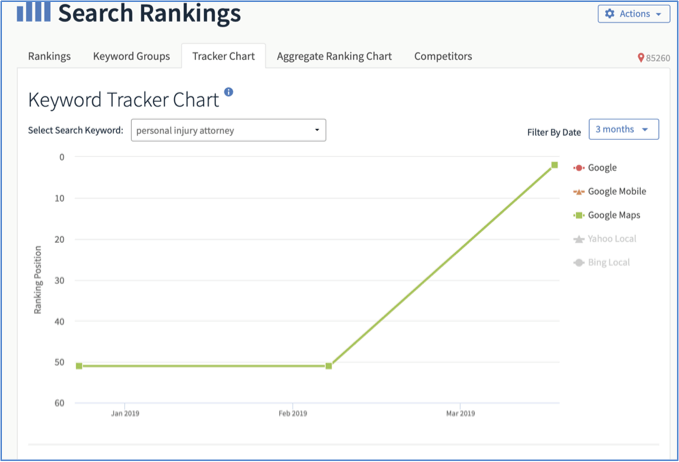
After just 90 days, this personal injury attorney ranked right at the top for one of the most profitable search terms in existence: “personal injury attorney”.
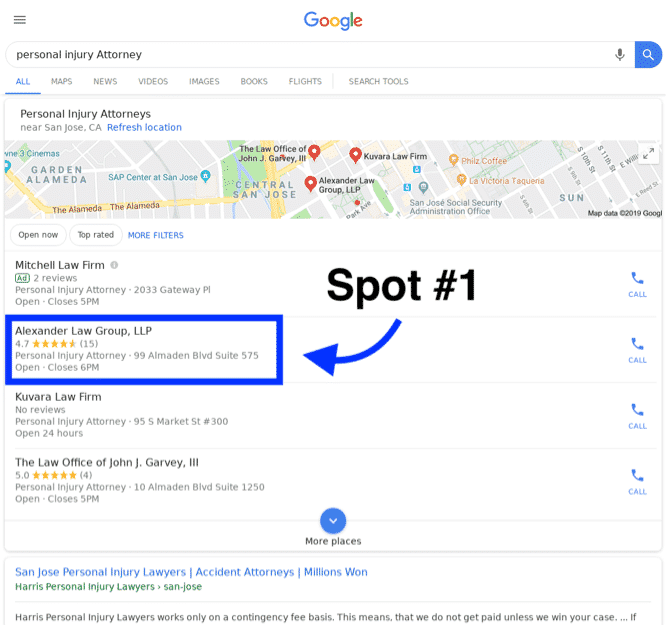
Starting to get the hang of how good this works?
Right, let’s move onto the next human influencer.
Human Influencer #3: Authority
When I had my first run at success, where I built a sales team of 145 and sold that company, something really strange happened.
I felt, all of the sudden, people listened to me. I got more respect and compliance from my family and friends. People would argue with me less.
In the back of my mind, I always wondered if there was something to that.
It turns out, that feeling I had was correct. It was the third known human influencer, known as Authority.
People are more likely to give money to a complete stranger for a parking meter, if that stranger is wearing a suit. Those wearing normal clothes achieved much less compliance. People dressed as the homeless got nothing.
The same is true of attorneys. When someone calls your office and asks to speak to an attorney, how the receptionist preframes the prospect is critical.
What they say next will determine whether they see you as a bad attorney (homeless), a good attorney (normal clothes), or an exceptional attorney (the suit).
Let me explain.
By getting the receptionist to mention the credentials, before the prospect talks to the attorney, we saw both an increase in appointments and retainers.
“A divorce attorney? Let me connect you with Alex, who has over 15 years’ experience in this area and is highly regarded by other attorneys.”
That simple change has the ability to increase your bottom line. Simply because it increases your perceived authority.
This led to a 15% increase in appointments, and a 20% increase in retainers.
You can even use review booklets, displaying what other clients have said about you. Or you can display your law degree above your desk in the office. The latter is often used by physiotherapist, where it is shows to increase the likelihood of clients sticking to exercise programs.
According to Alexandros Karakostasa and Daniel John Zizzo, who published a bunch of studies in Journal of Economic Behavior & Organization:
“A limited nudge, without an explicit justification, can induce compliance from 60% of the subjects..”
Compliance and the power of authority. Journal of Economic Behavior & Organization. Volume 124, April 2016, Pages 67-80
They found that even small gestures of authority were enough to influence the majority of participants.
And Google, again, is no different.
Just like people do, Google looks at your credentials.
What makes you trustworthy?
What makes you an authority?
Demonstrating your credentials on your website helps, but case results and reviews, help even more.
The problem for most attorneys is that Google compares them with hundreds of thousands of others.
Their credentials blend in like a single tree in the amazon rain forest.
Online reviews are a quick and easy way for Google’s computer to see how us mere humans view an attorney.
However, that’s not all. Links from other reputable websites, recommending your content, gives a further indication of your authority. They account for up to 25% of your ranking in Google. With reviews and links, you’ve already covered 40% of all ranking factors.
Someone would only link to you, talk about you, or share your content if it is worth it.
That’s why seeing your posts on Facebook gives Google such a good impression.
How can you implement this?
You already know that you need unique, high quality content, that speaks in a natural voice.
By using a simple strategy, you can give Google a bunch of positive authority signals, while increase the number of appointments you get.
When someone visits your website, we ‘cookie’ them. They go into a Facebook audience. You can then promote your content, and the rest of your website, to people who have visited you.
However, you do not offer them a sales pitch, you offer them a helping hand in the form of useful articles instead.
Not only does this genuinely help you and build your authority, but Google sees that people are visiting your website more than once. You’ll also be talked about on Facebook with posts shared.
Now, in order to increase the number of reviews you get, we use a simple review system called MRS.
It automatically reaches out to your happy clients and asks them for a review. Once they leave the review, it’ll analyze it, and decide whether or not they should be asked to share that review.
We’ve seen a huge increase in reviews for our attorneys using this system. And Google loves it.
For example:
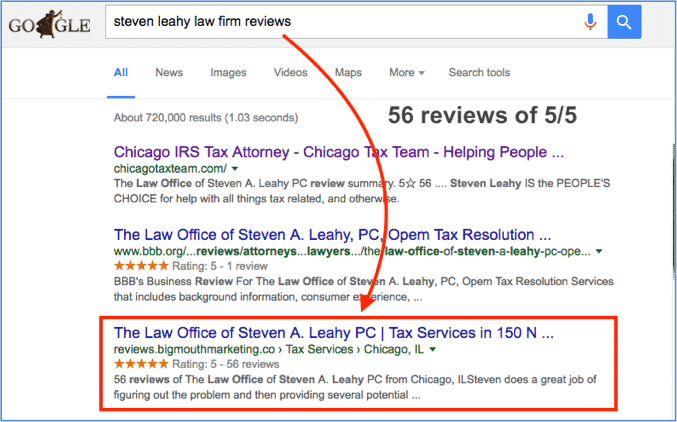
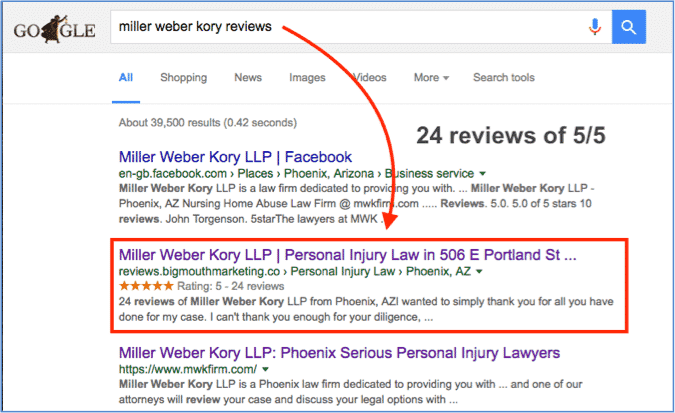
However, those are branded searches, which we will talk about later.
The big profits are made when you rank for a term like “personal injury attorney”.
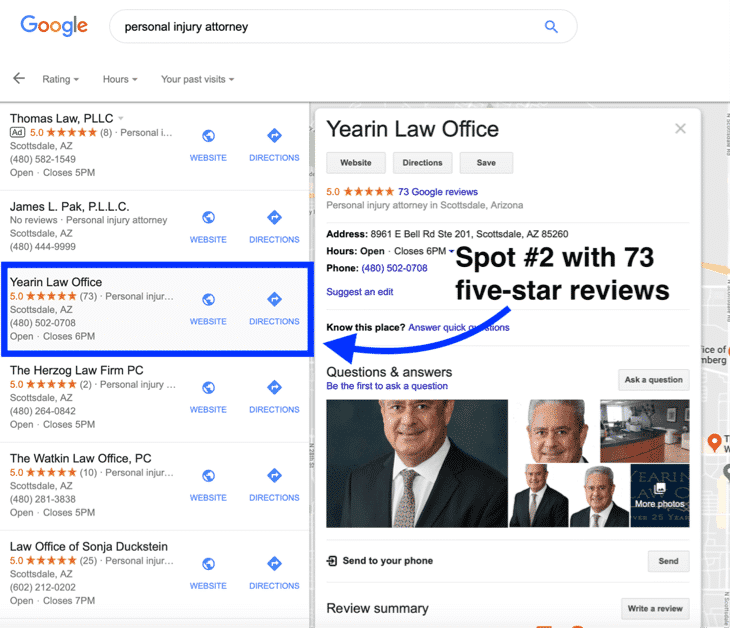
Who do you think the prospect will click on? The attorney with 73 reviews, or the one with zero?
This also feeds into Influencer #5, Consensus. More on that later.
Click here to read part 3 in this series.
Or…
If you would like us to execute this strategy for your law firm, click here to book an appointment.
Click here to read about the 2nd human influencer in PART 2.
If you would like to speak to us about growing your law firm, deploying this exact strategy, then click here to book an appointment.





Add a Comment